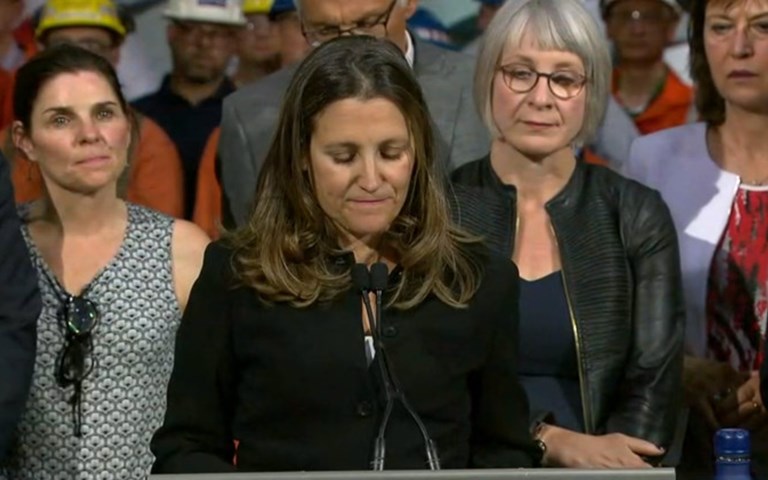Foreign Affairs Minister Chrystia Freeland announces retaliatory tariffs against the United States at the Stelco steel company in Hamilton, Ontario. Screencap courtesy of CTV News
Canada’s federal government is making a total of $2 billion in innovation, job training and work sharing funding available to the steel and aluminum industries.
Foreign Affairs Minister Chrystia Freeland, Economic Development Minister Navdeep Bains and Labour Minister Patty Hajdu also announced the government’s finalized list of retaliatory tariffs at the Stelco steel company in Hamilton, Ontario.
The tariffs, which go into effect on July 1, will hit U.S. steel and aluminum products and other items like maple syrup, yogurt, ketchup and whiskies. The list is divided between those that will receive a 25 per cent surcharge and those that will get 10 per cent.
“Canada’s approach is and will be this: we will not escalate and we will not back down,” Freeland said. “We are acting very much in sorrow not in anger, but the U.S. tariffs leave Canada no choice but to defend our industries, our workers and our communities.”
The tariffs constitute a $16.6-billion retaliation against the United States’ import tariffs on Canadian steel, aluminum and other products.
Freeland emphasized that the retaliatory actions to the “illegal and unjust tariffs” were permitted under NAFTA rules. “This is a responsive action. It is a perfectly reciprocal action,” she said. “Canada has quite intentionally been measured and restrained in its response.”
Canada launched a case at the World Trade Organization and under chapter 20 of NAFTA after the U.S. tariffs went into effect on June 1.
Related: President Donald Trump’s steel tariffs face constitutional challenge from industry group
The funding package for industry includes $250 million from the Strategic Innovation Fund to help steel and aluminum companies become more innovative; a combined total of $1.7 billion through the Business Development Bank of Canada and Export Development Canada to help companies prepare to export their products to other markets; and $50 million over five years to help businesses take advantage of recently signed trade agreements with the European Union and Asia.
“We have a fund in place, grants in place to support” both small and large companies, Bains said.
Hajdu said the federal government will also be contributing $25 million to extend the duration of work-sharing agreements to 76 weeks under the Employment Insurance program. Work-sharing agreements are eligible to employees who are working reduced work-weeks while their employer deals with reductions in business activity. It is typically available for a maximum period of 38 weeks.
An additional $50 million will be made available to the provinces and territories to provide skills and job training for workers in the affected industries, Hajdu said.
In addition to the government’s funding package, it will introduce safeguards around specific products. Bains said the government will be consulting with both industries to discuss which products should be safeguarded. Safeguarding products would involve placing tariffs and quotas to prevent foreign steel or aluminum, previously bound for the U.S., from being deflected into Canada.
In order to impose a safeguard, the government must launch an investigation with the Canadian International Trade Tribunal, but can impose provisional safeguards for up to 200 days pending the investigation’s outcome if there are “critical circumstances” where delaying to implement them could inflict difficult-to-repair damage on the domestic industry.
Canada’s steel industry employed more than 23,000 workers – about a third of them from Hamilton – and contributed $4.2 billion to the national GDP. The aluminum industry employs 10,500 workers and contributed $4.7 billion.



